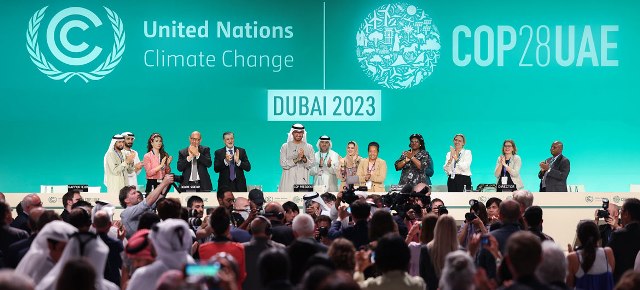Representatives from almost 200 nations reached a consensus to initiate a reduction in global fossil fuel consumption in a landmark decision at the COP28 climate summit in Dubai.
The agreement at COP28 would be marking a significant step towards mitigating the impacts of climate change and signaling the eventual decline of the oil age.
“Limiting global heating to 1.5°C, one of the keystone targets set in the landmark 2015 the Paris Agreement, will be impossible without the phase out of all fossil fuels,” United Nations Secretary General Antonio Guterres, said.
The negotiators at COP28 also agreed on commitments to triple renewables capacity and double energy efficiency by 2030 and made progress in relation to adaptation and finance.
Other progress was also made in relation to adaptation and finance, including – including the operationalization of the Loss and Damage Fund, even though financial commitments are very limited, according to the Secretary-General.
The hard-won deal, forged after intense negotiations spanning two weeks, aims to send a resounding message to both investors and policymakers: a unified global commitment to breaking away from fossil fuels is imperative to avert the looming climate catastrophe, as indicated by scientific experts.
Describing the agreement as “historic,” COP28 President Sultan al-Jaber emphasized the pivotal importance of its implementation. “We are what we do, not what we say,” he asserted during the packed plenary at the summit, underscoring the necessity of translating the agreement into actionable measures.
Notably, the accord received acclaim for achieving a consensus that had eluded decades of climate discussions. Norway’s Minister of Foreign Affairs, Espen Barth Eide, hailed it as the first instance of worldwide unity in acknowledging the imperative shift away from fossil fuels.
However, the negotiation process faced formidable opposition from the OPEC-led oil producer group, particularly regarding the inclusion of language to “phase out” oil, gas, and coal. This resistance prolonged the summit, raising concerns of a potential deadlock.
The control wielded by the Organization of the Petroleum Exporting Countries over a substantial portion of the world’s oil reserves and output added complexity to negotiations, given the economic reliance of member governments on these resources.
In a surprising turn, small island nations, highly vulnerable to climate change, found support from significant oil and gas producers such as the United States, Canada, Norway, the European Union, and numerous other nations in advocating for language urging the gradual abandonment of fossil fuels.
U.S. climate envoy John Kerry hailed the agreement as a testament to successful multilateralism and the alignment of individual interests with the collective good.
While some voices criticized the accord for its lack of ambition, notably Anne Rasmussen from the Alliance of Small Island States, her speech received a standing ovation despite her call for a more significant leap in actions.
The deal outlines a transition away from fossil fuels by 2050, aligning with scientific recommendations. It emphasizes an orderly shift toward cleaner energy systems, aiming for net-zero emissions, mirroring ongoing efforts in various countries transitioning to greener economies.
Despite commendation, concerns linger about the agreement’s adequacy in ensuring financial support for developing nations to pivot from fossil fuels. Critics argue that richer nations should offer more substantial financial aid to assist in this transition.
As countries now shoulder the responsibility of translating this agreement into tangible policies and investments, attention turns to the global community’s commitment to facilitating a just and equitable transition towards renewable energy sources while addressing the imminent climate crisis.

